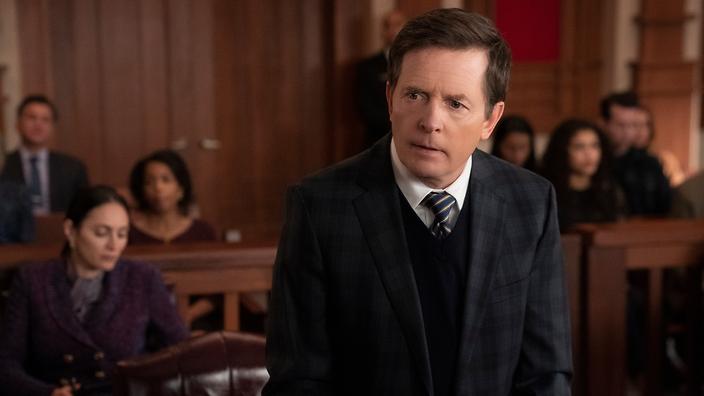By Lynn Venhaus
A heartbreaking documentary told with warmth and humor, “Still: A Michael J. Fox Movie” pulls no punches.
This unvarnished look at the life of beloved actor and advocate Michael J. Fox explores his personal and professional triumphs and travails as he confronts the incurable Parkinson’s Disease.
Neither a pity party nor a puff piece, the film is a thoughtful chronicle of the life and career of one-time “Boy Prince” of Hollywood as told through his performances and candid conversations with the film’s director Davis Guggenheim.
Guggenheim, a St. Louis native who became an Oscar-winning documentarian (for “An Inconvenient Truth” in 2007), takes a compelling approach to shaping the narrative.
With quick-cut editing of Fox’s TV and film work, he highlights the actor’s physicality and crisp comic timing that boosted him from breakout ‘80s sitcom star to mega-popular movie mainstay. They also illustrate scenes from his life using actors that are artfully staged.
Two striking visual takeaways include how much running he did as a young whirling dervish and how much prescription medicine he must take to help control his symptoms.
Growing up in Canada, he moved to Los Angeles at age 18, and was mired in dire straits pretty much until his fortuitous casting as Alex P. Keaton, the Reagan-era conservative kid raised by hippie activist parents in “Family Ties” (1982-1989).

He became a sensation as an integral part of NBC’s Thursday night “Must-See TV” lineup, replaced actor Eric Stoltz as Marty McFly in 1985’s mega-hit movie “Back to the Future,” launched a franchise, and was reliable box-office until a string of duds in the ‘90s — “Life with Mikey,” “For Love or Money,” “Greedy,” “Doc Hollywood” among them — became a catalyst for him returning to TV in 1996 with the hit sitcom “Spin City.”
His career achievements include five Emmy Awards for “Family Ties” and “Spin City” as lead actor in a comedy series, one for guest actor in “Rescue Me.” After going public with his young-onset Parkinson’s Disease diagnosis in 1998, he appeared on such shows as “The Good Wife,” :The Good Fight,” “Boston Legal,” and “Curb Your Enthusiasm.” Among his movies were “Teen Wolf,” “The Secret of My Success,” “The American President,” “Homeward Bound” (voice of Chance), “Stuart Little” (voice), “The Casualties of War,” “The Frighteners,” “Light of Day,” “Bright Lights, Big City” and “Mars Attacks!”

Retired from acting since 2020, Fox has written four books, and the movie uses them as source material.
Fox noticed his pinky finger moved uncontrollably in 1991, when he was filming “Doc Hollywood,” and later diagnosed as the incurable Parkinson’s Disease. He was 29.
His hid the trembling as best as he could, but psychologically, the effects were taking its toll. He frankly discusses his struggles and challenges, as we see the physical disabilities and what he has had to go through.
His outlook is remarkable, and he displays a toughness we haven’t seen before. His wife of 35 years, Tracy Pollan, is as much a profile in courage as he is. They have four children – son Sam, twin daughters Esme Annabelle and Aquinnah, and youngest daughter Schuyler.
His family is a guiding force, a source of sustenance and strength, and grounded. They show the laughter, not the tears.
The amount of advocacy and awareness he has done regarding Parkinson’s is immeasurable, raising over two billion dollars through his foundation to date (The Michael J. Fox Foundation for Parkinson’s Research).
Last fall, he was given an honorary Oscar, the Jean Hersholt Humanitarian Award, last year by the Academy of Motion Picture Arts and Sciences.
While he is matter-of-fact about his limitations, the impact he continues to have is inspiring. Now 61, his legacy is rich, and you will appreciate the man even more for his humanity than his admirable talent upon viewing this 1 hour, 36 minutes ode to living.

“Still: A Michael J. Fox Movie” is a 2023 documentary directed by Davis Guggenheim. It is rated R for language and the run time is 1 hour, 36 minutes. In select theatres and streaming on Apple TV + starting May 12

Lynn (Zipfel) Venhaus has had a continuous byline in St. Louis metro region publications since 1978. She writes features and news for Belleville News-Democrat and contributes to St. Louis magazine and other publications.
She is a Rotten Tomatoes-approved film critic, currently reviews films for Webster-Kirkwood Times and KTRS Radio, covers entertainment for PopLifeSTL.com and co-hosts podcast PopLifeSTL.com…Presents.
She is a member of Critics Choice Association, where she serves on the women’s and marketing committees; Alliance of Women Film Journalists; and on the board of the St. Louis Film Critics Association. She is a founding and board member of the St. Louis Theater Circle.
She is retired from teaching journalism/media as an adjunct college instructor.

